The cold facts
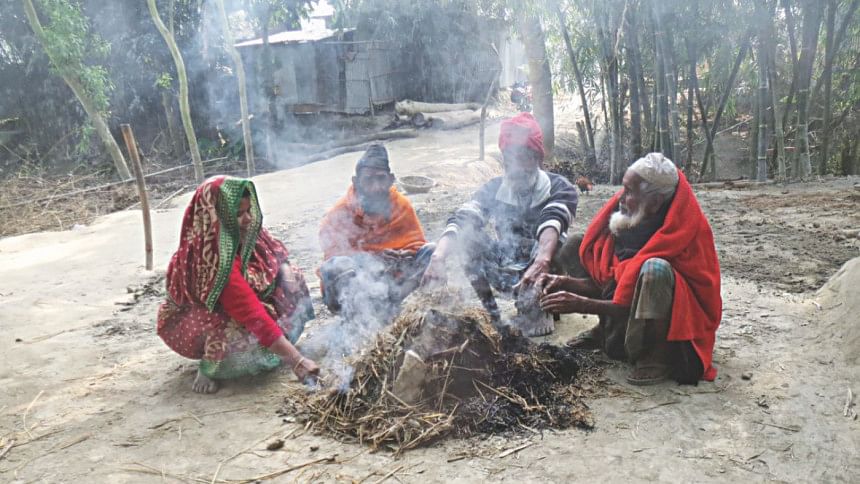
There are quite a few things to be noted about the on-going cold wave. Of them, two are obvious. For one thing, it has been relentless in its pattern, and therefore, cumulative and gripping in its chilling effect. The wave, said to be a precursor of another one, towards January-end, has been continuing since January 3 without a respite. The stretch itself makes a record of sorts.
The other more weighty, record-breaking feature is the lowest temperature registered in 68 years. The mercury dropped to 2.6 degrees Celsius at Tetulia, followed by 2.9 at Syedpur, 3.2 in Dinajpur and 4.9 in Rangpur as the wave swept through the whole of the small deltaic country.
Dhaka's 9.5 was chilling enough, and interestingly though, it felt colder inside home than outside! A plausible explanation for this paradox is the absorption and retention of cold for a number of days in the concrete structure of the house you live in. By the same token, the concrete jungle that the capital city has become soaks up the chill, leaving the streets perhaps a bit warmer, what with the jammed gas spewing vehicles adding to it!
Besides, in tropical climate, our houses are not built to cushion against nippy weather. Some households may plug into a heating arrangement.
Incidentally, countries with long and severe winters apply two measures to gauge temperature. One is the "windchill" relevant to mobility purposes and the other is the mercury-read temperature. Windchill temperature feels colder to your body as the heat is pulled from your skin or body in the open air.
Not only is Bangladesh trembling in the grip of cold, the western world, which is used to snowing, too is going through extreme weather episodes. Last year, New Zealand experienced wintry cold in summer. This year, between two ends of the world, the difference in temperature was as wide as 100 degrees Celsius. In Canada, the temperature plummeted to minus-50 degrees Celsius, while in Sydney, it rose to 48 degrees Celsius, striking fear for bush fire and spoiling a repairing innings by weather-debilitated English batsman and skipper Joe Root in the last match of the Ashes.
Vast areas of north-east America and Canada are reeling under the impact of what is termed as "bomb cyclone." Boston has had the lowest temperature since 1896. A terminal in John F. Kennedy airport went under water after an underground pipe had been breached; air travel was severely affected.
All this comes about in the aftermath of Trump's trumpeting his rejectionist policy towards the historic Paris climate agreement and openly bragging that climate change could indeed bring good to the planet.
Climate sceptics often make a skin-deep claim that icy winters disprove global warming. On the contrary, new research suggests that icy weather "reinforces the case for global warming." A Tokyo university research initiative in the polar region produced a vindicating outcome as published in the Journal Nature. Geo-science has linked cold weather with "rapid decline of Arctic Sea ice," caused by warming over the past decade.
You have an elaborate explanation of the phenomenon in the following words of Geoffrey Lean: "As the ice melts it exposes open water which, being very much darker, absorbs more heat. The warmer water then warms the air above it which in turn weakens the jet stream, the high level river of air which does much to determine the weather" (The Telegraph, October 27, 2014).
Bangla daily Prothom Alo, in its issue of January 9, attributed three reasons to the cold wave sweeping Bangladesh: cold wind from Siberia, severer than before; the jet stream usually stationary 40-45 thousand feet above land came down to 30-40 thousand feet; and the cold wind blowing in an "anti-cyclonic or reverse motion."
However fascinating geo-scientific explanations of the extreme weather episodes may be, they boil down to two intertwined issues on the ground: One, standing by the cold-wreaked urban and rural poor as an immediate step and the other, centred on ensuring survival of the planet. The latter needs to be pressed forward with new urgency to prove equal to the tasks of mitigating and adapting to climate change effects as a force of good for humanity.
In just about a week, 30 persons have died from cold in Bangladesh with the elderly, women, children, the landless and the destitute being the most vulnerable to the calamity. Their plight is imaginable, without adequate clothes to tolerate the chill and blankets to sleep under. One middle-aged man gave a graphic description of the perilous nights he passed without a wink of sleep—sitting and standing in searing discomfiture.
One lesson we should have learnt is, we were caught unprepared by the unprecedented cold wave. We must accept the "unprecedented" to be not a new but an old normal from now on.
Shah Husain Imam is adjunct faculty at the East West University, a commentator on current affairs, and former Associate Editor, The Daily Star.
Email: [email protected]




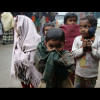
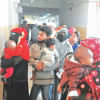
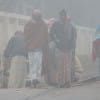
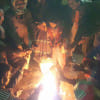


Comments